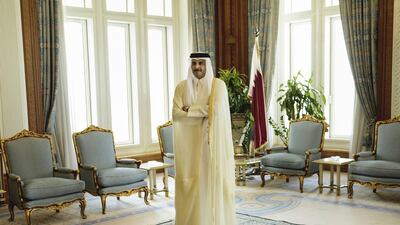When the former emir of Qatar, Hamad bin Khalifa, handed over power to his son in June 2013, many in the Gulf hoped the transition would herald a new beginning for Qatar’s relationship with its neighbours. Since the Arab uprisings two years earlier, Doha had played an outsize role in changing the geopolitical map of the region to the detriment of its neighbours’ interests. It aligned itself with what seemed to be the primary benefactors of the new Arab world, namely the Muslim Brotherhood and other Islamists.
By the time Sheikh Tamim took over, the regional standing of Islamists appeared to be declining. The perception then was that the new emir was poised to lead a foreign policy transition too, away from the divisive ways of his father. Chatter in the Gulf suggested that Sheikh Tamim was close to the Saudi royal court before his ascent to power, unlike his father who captured power in a coup in 1995 and pursued a truculent policy to rival his larger neighbour.
A test of the optimism came a week after he took office, with the removal of Mohammed Morsi, Egypt’s Islamist president. The rift between Qatar, on one hand, and Saudi Arabia and the UAE, on the other, deepened. For several months, Sheikh Tamim insisted that he wanted to keep the Qatari foreign policy in synch with that of its neighbours. The problem, the Saudis and Emiratis were told, was that the new emir could not reverse policies overnight.
Attempts to settle differences behind closed doors failed. In March 2014, Riyadh, Abu Dhabi and Manama recalled their ambassadors from Doha in protest at what they described as policies that threatened regional stability. The public move was uncharacteristic of Gulf politics, and citizens and expatriates immediately realised, without necessarily knowing the details, that the feud must have been too deep for those countries to take such an action publicly.
The four countries resumed talks and Qatar bowed down the following month to a set of demands. The demands included refraining from undermining another country’s security, interests and safety; reining in media outlets critical of the Gulf countries; cessation of support to the Muslim Brotherhood and the Houthis; putting an end to Qatar’s naturalisation of nationals of other Gulf countries. (Qatar was accused of providing Qatari citizenship, besides financial support, to Islamist oppositionists from other Gulf countries.)
Qatar was given a three-month period to prove its compliance. Authorities there deported Islamist figures previously domiciled in Doha, and supposedly took steps to roll back its support for Islamists in Libya, Syria, Yemen and the Gulf. Youssef Al Qaradawi, a senior Egyptian cleric and the nominal spiritual leader of the Muslim Brotherhood, stopped giving Friday sermons for a few weeks. The row was visibly contained.
Until Monday. The three Gulf states announced unprecedented measures against Qatar, severing diplomatic ties and shutting down all land, air and sea crossings. The rigorous action was accompanied by equally unprecedented media attacks: “Qatari opposition” called for Sheikh Tamim’s removal and the establishment of a “national accord government”, no doubt an ironic echoing of calls made by Qatar’s proxies during the Arab uprisings.
The rhetoric is more serious and damaging than the economic and diplomatic measures, as anyone familiar with Gulf politics will recognise.
What happened between 2014 and Monday to warrant such action? Why now? There was no such thing as a spark. As described by an official familiar with the process, the situation escalated over time, specifically since January 2015, when King Salman took office. The new king subsequently inaugurated a new approach to engage Qatar.
Riyadh reset its relations with Qatar, and began a dialogue to resolve all outstanding issues. The Saudis also pushed the more sceptical UAE to do the same, especially since the 2014 agreement led nowhere anyway. The new approach, according to the official, emboldened the Qataris, who felt the pressure was off to revert to old policies. The timing of the reset may have also indicated to Qatar that Riyadh was too stretched in Yemen, and preoccupied with the effort to counter Iran under the Trump presidency, to pick a fight with pro-Islamist Qatar.
Tension was coming to a head for some time and what officials describe as “unacceptable behaviour” by Qatar increased recently. Whenever confronted, officials say, Qatar would deny and obfuscate. Media attacks emanating from Doha-funded outlets noticeably heightened in recent months. Riyadh, per the public statement, also accused the Qataris of supporting Shia Islamists in Bahrain and Saudi Arabia's eastern region.
A combination of factors led the Gulf states to act against Qatar at this time. The American unease about Qatar’s role in the financing of extremist organisations in the Middle East, and the momentum of the Riyadh-Washington relationship, meant that if there was a time to attempt to change Qatar’s behaviour, it was now.
Each of the Gulf states has its own reasons for escalating against Qatar, with the common denominator being the support of Shia and Sunni Islamists against their interests. For now, the Qatari emir’s immediate concern is to demonstrate strength before his people — as indicated by his ceremonial Ramadan iftar with Al Qaradawi on Monday. But Qatar’s priority will no doubt be to seek a de-escalation as soon as possible, while the Gulf powers are determined to change Doha’s behaviour. The question is how, not if, it will be changed.
Hassan Hassan is a senior fellow at the Tahrir Institute for Middle East Policy and co-author of ISIS: Inside the Army of Terror
On Twitter: @hxhassan

